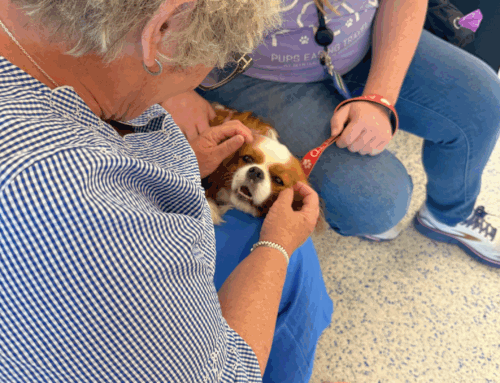Looking for something special and exciting to do this summer? Take a few weeks to get your dog certified and registered to become a therapy dog with the Alliance of Therapy Dogs (ATD). By volunteering your time, you will be making the lives of others exponentially more full. You will be sharing your sweet dog with someone in need, which will leave everyone feeling as bright as that summer sunshine.
Why Dog Therapy Matters: Mental Health
A room with a dog has a very different atmosphere than one without a dog. When it comes to therapy, patients are generally at their most stressed. Understandably, feeling vulnerable can cause a lot of anxiety. A dog’s nonjudgmental and loving disposition can help a patient to feel more calm and open to therapeutic techniques. Many patients with mental illness benefit from dog therapy, and it’s not hard to see why. Dog therapy has been tried and true for patients with dementia, Alzheimer’s, depression, PTSD, and autism. Some of the ways dog therapy impacts mental health patients are as follows:
- Feelings of comfort and safety
- A sense of community and increased prosocial behaviors
- More of a motivation to get better
- Enhanced self-esteem
- Reduced loneliness and feelings of isolation or alienation
- Reduced boredom
According to UCLA Health, children with autism felt a deep bond with the animals and were better able to relate to them than humans. They were more talkative and social in therapy situations when a dog was present. There is also evidence of dogs helping those with Alzheimer’s retain and recall memories more consistently.
By comforting, entertaining, and engaging people, therapy dogs are honestly humankind’s best friend. And while the benefits of dog therapy are easy to see, there is also scientific evidence of the benefits on a chemical level.
The Chemical Science: Physical Health
Dog therapy can change the way the functions of the human body occur. If you have owned or been around a dog, you have probably felt how they light up a room. There are many reasons for that! The following are some of the ways in which dog therapy affects the body on a biological level:
- Lowers blood pressure
- Releases endorphins such as oxytocin which have a calming effect
- Petting the dog produces an automatic relaxation response: promotes the release of natural upper hormones–serotonin, prolactin, oxytocin, and phenylethylamine (which has the same effect as chocolate)
- Reduces the amount of medications a patient will need to take, causing the chemical makeup of the patient’s body to shift to a more natural level
- Slows breathing in those who are anxious
Where Do Therapy Dogs Go?
The dogs registered with Alliance of Therapy Dogs visit “airports, nursing homes, assisted living facilities, rehab facilities, mental health institutions, schools, hospitals, cancer centers, hospice facilities, college campuses and can also provide therapy in patients’ homes.” The possibilities are unlimited, as the dogs and their volunteers are willing to go wherever it takes to help someone in need of a good pupper. Visits range from a general meet and greet to individual attention and time spent developing a personal connection with one patient.
What Is the Training Process?
If you and your pup are considering becoming a registered volunteer, it will only take a few weeks of your time. ATD has a straightforward and thorough training process to ensure the safety and well-being of everyone involved. That’s what makes it the leader in therapy pet certification. To become registered, a Tester/Observer (T/O) will make sure you and your dog have a good relationship, and that your dog has a good-hearted nature. Following the test, the T/O will guide you through three visits to facilities which will include two medical facilities. Once you pass, you will be recommended for registration with ATD. Easy enough for all of the excitement ahead! There is no greater joy than watching your dog bring happiness to someone who truly needs it, Not to mention the adventures of each visit will be a unique experience you won’t soon forget.
Being a Volunteer
By volunteering you and your dog, you will get to see the benefits of dog therapy firsthand in the lives of those you affect. Perhaps lesser-known are the benefits you will see in yourself. It’s true that the act of volunteering gives a sense of pride and joy, and has the power to transform your life. What’s fascinating is the parallel between the transformation in your life and that of your patients.
Not only do volunteers experience lower rates of depression, they also feel a greater sense of community and connection, much like their patients feel after a visit. Additionally, those who volunteer have a lower mortality rate than those who do not. This is a result of the sense of purpose volunteers feel when they are in service to someone who needs it. It just goes to show that dog therapy is as useful for the people who practice it as the people who receive it.
If you are looking to make a positive change this summer, why not consider becoming registered for dog therapy? ATD will be happy to accept you and your furry friend for consideration. Together, the dogs of the world can unite and make a difference in the lives of those who are struggling.






